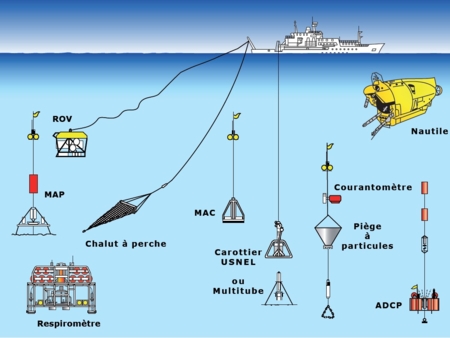Resilience of deep-sea hydrothermal vent communities: results of a disturbance experiment implemented on the Lucky Strike vent field (Mid-Atlantic ridge)
Abstract
Hydrothermal ecosystems can be naturally subject to disturbances linked to tectonic and volcanic activities. Forty years after their discovery, we now have a fair knowledge of the factors structuring their biodiversity. However, our understanding of recolonisation dynamics is restricted and greatly limits our ability to predict their resilience in response to disturbances, whether natural or anthropogenic. With the increasing interest of mining companies for the exploitation of deep-sea minerals, it becomes urgent that we increase our efforts to better understand the mechanisms involved in the recovery of impacted communities. The main objective of this thesis is therefore to describe the recolonisation dynamics of macrofaunal assemblages following a small-scale disturbance induced within the Lucky Strike hydrothermal field (1700 m depth, Mid-Atlantic Ridge). We thuse implemented an in situ defaunation experiment and monitored the composition, diversity as well as the food-web structure of vent communities during the two years following the disturbance. Despite a rapid return of the taxonomic richness and food-web structure, our results suggest an incomplete recovery of organism densities and significant changes in community structure compared to reference assemblages. In addition to environmental factors, biotic interactions appear to play a major role in the colonisation and ecological succession of the studied assemblages. The use of an experimental approach, coupled with reproductive trait analysis for the dominant species, provide crucial information on the ability of hydrothermal communities to maintain their overall structure and functions in face of a disturbance, and infer their dispersal abilities to recolonise impacted habitats.
Key words: Hydrothermal vent, disturbance, recovery, recolonisation dynamic, community structure, food-web, reproductive traits
Board
Dr Lauren Mullineaux - Woods Hole Oceanographic Institution USA (Rapporteur)
Prof. Eric Thiébaut - Sorbonne Université, Roscoff (Rapporteur)
Dr François Le Loc'h - Université de Bretagne Occidentale, UMR LEMAR, Brest
Dr Ana Hilário - Universidade de Aveiro, Portugal
Dr Thierry Comtet - Sorbonne Université, Roscoff







